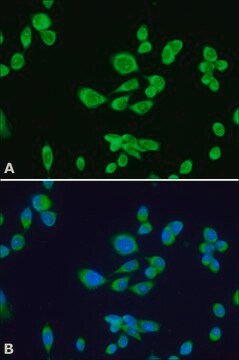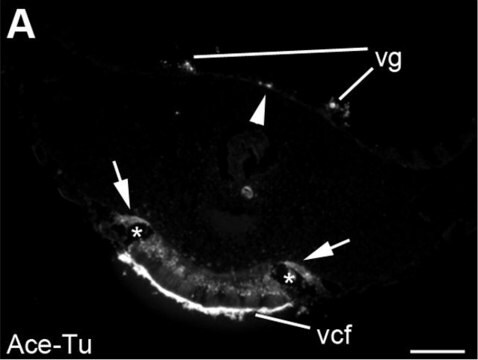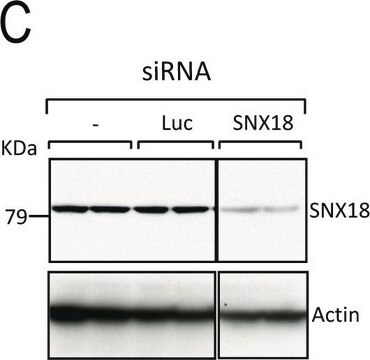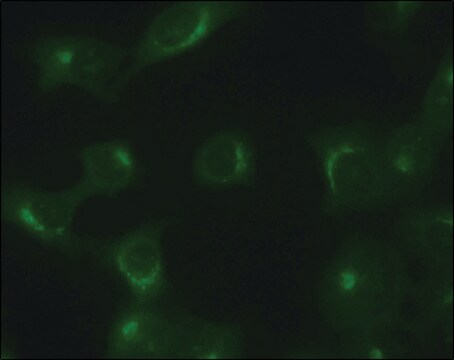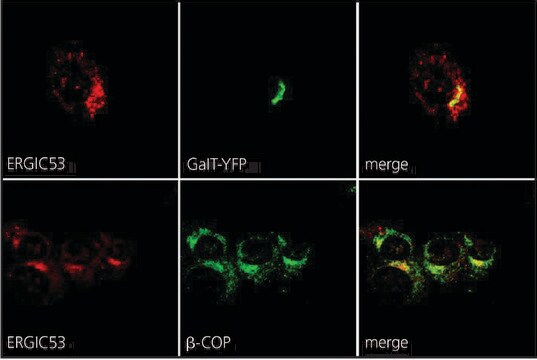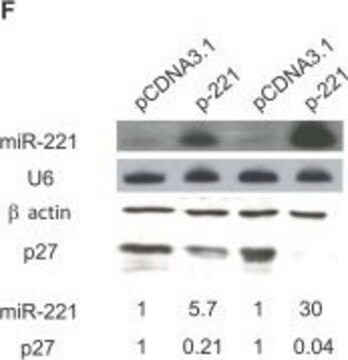推荐产品
生物源
mouse
品質等級
共軛
unconjugated
抗體表格
ascites fluid
抗體產品種類
primary antibodies
無性繁殖
M3A5, monoclonal
包含
15 mM sodium azide
物種活性
monkey, human, chicken, goose, rabbit, canine, bovine, kangaroo rat, rat, hamster
技術
immunocytochemistry: suitable
immunoprecipitation (IP): suitable
indirect immunofluorescence: 1:20 using cultured Chinese hamster ovary (CHO) cells
同型
IgG1
UniProt登錄號
運輸包裝
dry ice
儲存溫度
−20°C
目標翻譯後修改
unmodified
基因資訊
human ... COPB1(1315)
rat ... Copb1(114023)
一般說明
Monoclonal Anti- β-COP (mouse IgG1 isotype) is derived from the M3A5 hybridoma produced by the fusion of mouse myeloma cells and splenocytes from an immunized mouse. COPs (coatomer proteins) have a molar mass of 110 kDa and its primary structure is homologous to the β-adaptin component of clathrin-coated vesicles.
The coatomer (approx. 550kDa) consists of proteins designated α-, β-, γ-, and δ-COP, together with substoichiometric amounts of several other proteins.
特異性
The antibody recognizes an epitope shared by β-COP (110 kDa) found in most tissue culture lines, and by a doublet of brain microtubule-associated protein (MAP2, 270-300 kDa). The antibody stains a reticular structure in the perinuclear area of non-neuronal cells (the periphery of Golgi complex and a population of coatomers scattered throughout the cytoplasm) in tissues from different species and cell processes, as well as cell bodies in chicken brain neuronal cells. It has been used for studies on the effects of various agents that influence energy status, disrupt the Golgi complex, or alter the activity of G-proteins or small GTP-binding proteins on the cellular localization of β-COP. The antibody may be used for the immunoaffinity purification of the protein.
免疫原
microtubule-associated protein from goose brain.
應用
Monoclonal Anti-β-COP antibody produced in mouse has been used:
- for the localization of β-COP using immunoprecipitation
- in immunocytochemistry
- in immunoblotting
- with other antibodies to Golgi proteins to study the role and relationships of this protein in the cell
生化/生理作用
COPs (coatomer proteins) are transiently attached to the vesicles involved in transport within the Golgi complex and possibly between the rough ER and Golgi complex.
免責聲明
Unless otherwise stated in our catalog or other company documentation accompanying the product(s), our products are intended for research use only and are not to be used for any other purpose, which includes but is not limited to, unauthorized commercial uses, in vitro diagnostic uses, ex vivo or in vivo therapeutic uses or any type of consumption or application to humans or animals.
未找到合适的产品?
试试我们的产品选型工具.
儲存類別代碼
10 - Combustible liquids
水污染物質分類(WGK)
nwg
閃點(°F)
Not applicable
閃點(°C)
Not applicable
M A Stamnes et al.
Proceedings of the National Academy of Sciences of the United States of America, 92(17), 8011-8015 (1995-08-15)
We have isolated a major integral membrane protein from Golgi-derived coatomer-coated vesicles. This 24-kDa protein, p24, defines a family of integral membrane proteins with homologs present in yeast and humans. In addition to sequence similarity, all p24 family members contain
D Kondo et al.
Journal of the American Society of Nephrology : JASN, 11(5), 803-813 (2000-04-20)
Agene encoding olfactomedin-related glycoprotein was isolated from rat glomerulus despite its prior identification as a neuron-specific gene. The mRNA expression was remarkably intense in renal glomerulus and brain and faint in the lung and eye among rat systemic organs. Although
L Orci et al.
Nature, 362(6421), 648-652 (1993-04-15)
Do the coats on vesicles budded from the Golgi apparatus actually cause the budding, or do they simply coat buds (Fig. 1)? One view (the membrane-mediated budding hypothesis) is that budding is an intrinsic property of Golgi membranes not requiring
T E Kreis et al.
Annual review of cell and developmental biology, 11, 677-706 (1995-01-01)
Cytosolic coat proteins (COPs) regulate membrane traffic in eukaryotic cells. Three classes of coat protein complexes have so far been identified: clathrin and its adaptor proteins, coatomer (COPI), and COPII. Coatomer (composed of seven different subunits) and ADP-ribosylation factor (ARF)
G J Choukroun et al.
The Journal of clinical investigation, 106(8), 983-993 (2000-10-18)
The Golgi complex and the trans-Golgi network are critical cellular organelles involved in the endocytic and biosynthetic pathways of protein trafficking. Lipids have been implicated in the regulation of membrane-protein trafficking, vesicular fusion, and targeting. We have explored the role
我们的科学家团队拥有各种研究领域经验,包括生命科学、材料科学、化学合成、色谱、分析及许多其他领域.
联系技术服务部门